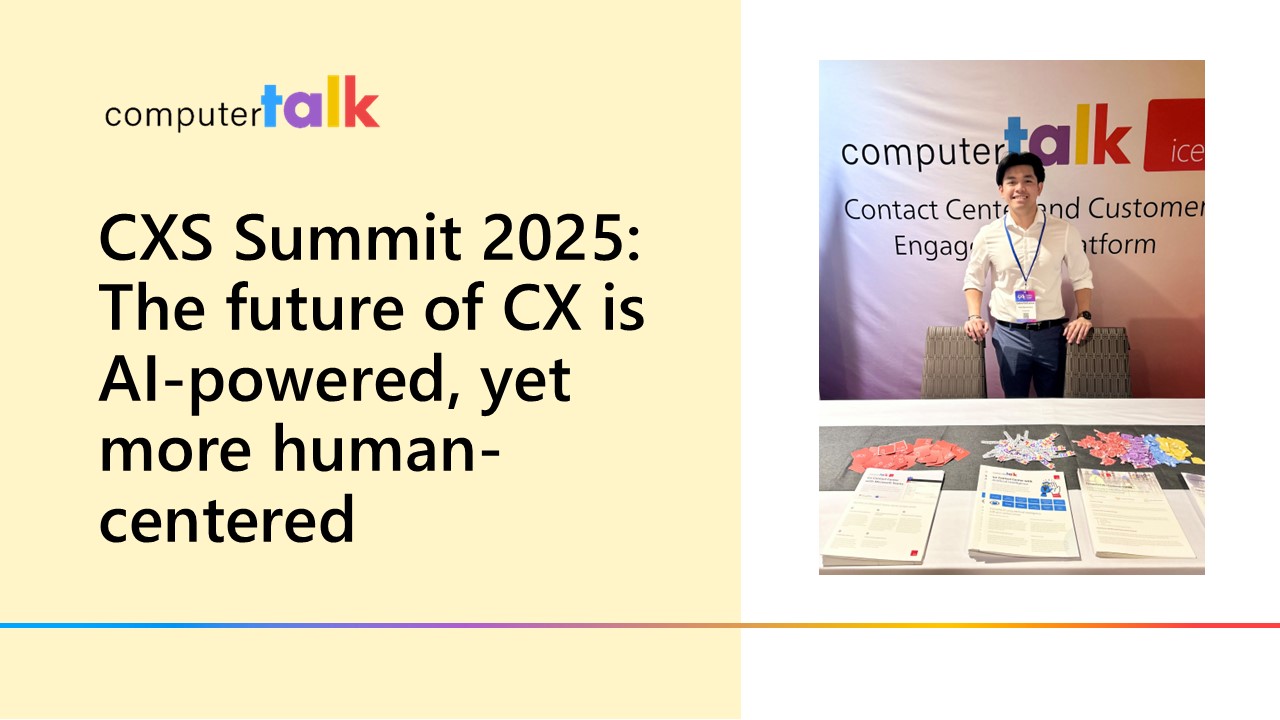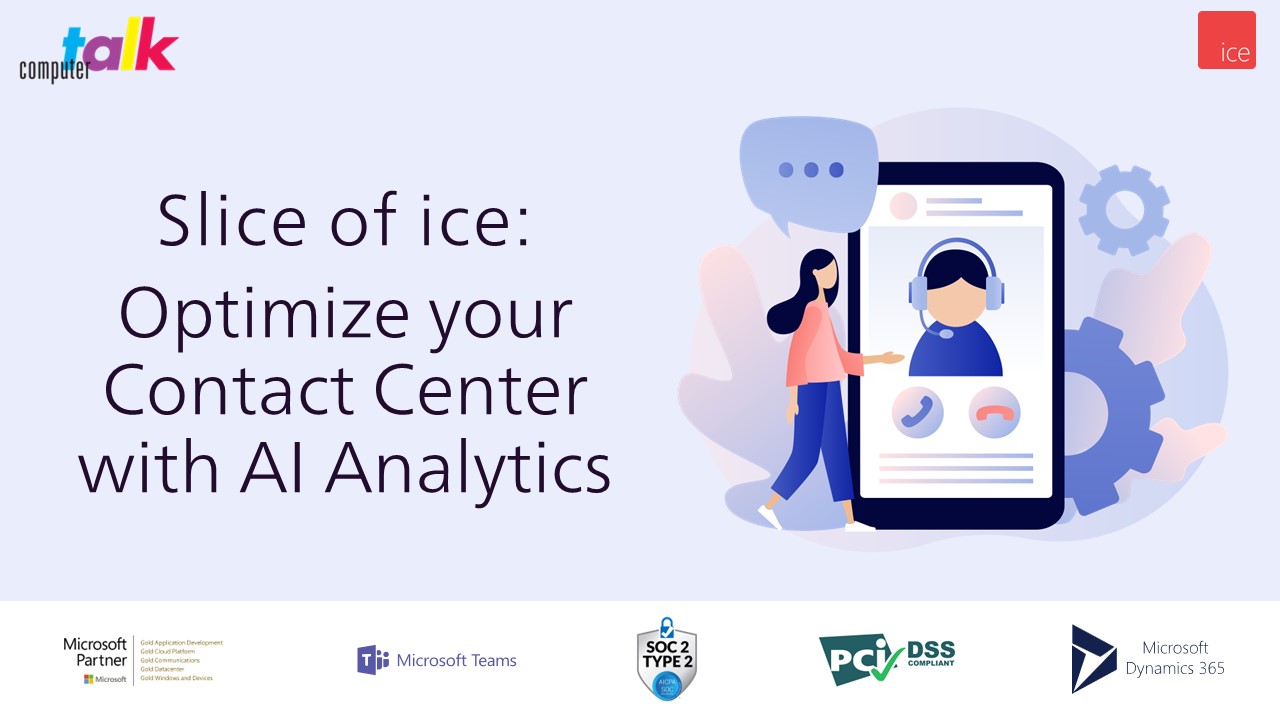CXS Summit 2025: The future of CX is AI-powered, yet more human-centered
by Gabriel De Guzman | Published On June 12, 2025

The CXS Summit 2025 was both exciting and eye-opening. As someone still early in my career and new to the CX industry, I went in hoping to better understand the greatest challenges organizations are facing in CX. What I took away from the conference was not just insights on how to improve an organization’s customer experience, but a deeper appreciation for why the work we do at ComputerTalk is so meaningful.
From AI and automation to customer trust and brand loyalty, the conversations at the Summit made one thing clear: customer experience is the heart of every successful business. The companies that are thriving are the ones that bring people, technology, and strategy into alignment.
The Summit kicked off with a sobering yet energizing message: CX as we know it is undergoing its most significant transformation in history. Customer satisfaction scores are declining, expectations are rising, and change is accelerating. In fact, one speaker predicted that by 2027, organizations will need to adapt to three major changes every month just to keep pace.
That urgency resonated with me. We can’t just tweak processes or add new features. Companies must rethink how they deliver value and ask themselves: What are our customers truly frustrated with? And more importantly: Are we truly listening?
AI is not the strategy, it’s the experience
AI was a constant theme, but what stood out was the nuance. There’s no doubt that the CX market today is overcrowded, with big CCaaS competitors adding more fancy bells and whistles to their products to keep up with new, hot AI companies tapping into the agentic AI rush. But I find that it’s not about deploying AI for the sake of innovation; but it’s about using it with intention. David McQuarrie, CCO of HP, put it this way: the shift is toward “local AI” – or real-time, secure, and fast AI. But the bigger insight was this: You don’t want an AI strategy; you want an experience strategy.
Companies that succeed won’t necessarily be the ones with the flashiest AI tools. They’ll be the ones asking, “How can this help our people serve our customers better?” It’s not about replacing humans. It’s about augmenting them. Or, as McQuarrie put it plainly: “AI won’t replace humans, but those who don’t use AI will be replaced by those who do.” That was powerful.
Insights from the speakers: alignment, dialogue, culture and support
From OLG to CIBC, there was one theme in every panel: cross-functional alignment is non-negotiable. Whether you're dealing with a service breakdown or launching a new digital experience, everyone - from product to marketing to customer support - needs to be in the room and on the same page.
One powerful idea came from the OLG panel: commit to ongoing dialogue with customers. CX is about actively listening, anticipating, and co-creating better experiences, not just reacting to and minimizing customer complaints and maintaining reputation. CX encompasses a broad range of strategies that effectively impact the end user or customer.
The session with TikTok hit a different note - more cultural than operational - but just as vital. In an era where attention spans are shorter than ever, the temptation is to chase trends. But virality without purpose is a dead end. Instead, the advice was clear: Build with consistency, community, and authenticity. Brands that endure don’t just go viral. They stay relevant. That means knowing your audience, engaging meaningfully, and remembering that not every trend is worth following.
The D2L and Forethought session was one of the most eye-opening for me. For D2L, supporting 15 million users in over 30 countries isn’t just a logistics challenge but also a human challenge. Their answer? AI-powered agents that empower human agents, personalize interactions, and turn support into a source of innovation and loyalty. Support is where a company shines – where your best insights and your strongest brand equity can be built.
Closing Remarks
This was my first industry conference, and I found myself asking many of the questions the speakers were asking each other:
- How do you scale without losing your human touch?
- How do you balance speed with empathy?
- How do you move from reacting to problems to designing better experiences from the ground up?
Read: How to Maintain a Human Touch While Embracing Customer Service Automation
CX is evolving fast, and the leaders in this space are the ones willing to get uncomfortable, challenge their assumptions, and listen deeply to their customers, teams, and the market. The CXS Summit was a reminder that customer experience isn’t a fixed goal, but a continuous journey shaped by changing expectations, emerging technologies, and human connection.
For me, the Summit was more than just an event - it was a chance to see how different industries are navigating similar challenges, and to better understand where the CX space is headed. I’m still early in my journey, but I left with a deeper appreciation for the complexity of this work and a renewed curiosity to keep asking the right questions.
For more insights on how AI is impacting customer experiences, check out How Conversational AI Can Enhance Customer Service in 2025.
More from our blog
 On Wednesday, May 3rd, ComputerTalk, in partnership with Tethr, presented our latest Slice of ice webinar, Optimize Your Contact Center with AI Analytics.
On Wednesday, May 3rd, ComputerTalk, in partnership with Tethr, presented our latest Slice of ice webinar, Optimize Your Contact Center with AI Analytics.
.jpg?sfvrsn=4962c36_1) Explore the differences between Power BI and Microsoft Fabric for contact centers, including architecture, data pipelines, real-time analytics, governance, and advanced AI capabilities.
Explore the differences between Power BI and Microsoft Fabric for contact centers, including architecture, data pipelines, real-time analytics, governance, and advanced AI capabilities.
 There are many ways to improve employee satisfaction and reduce churn in customer service.
There are many ways to improve employee satisfaction and reduce churn in customer service.

